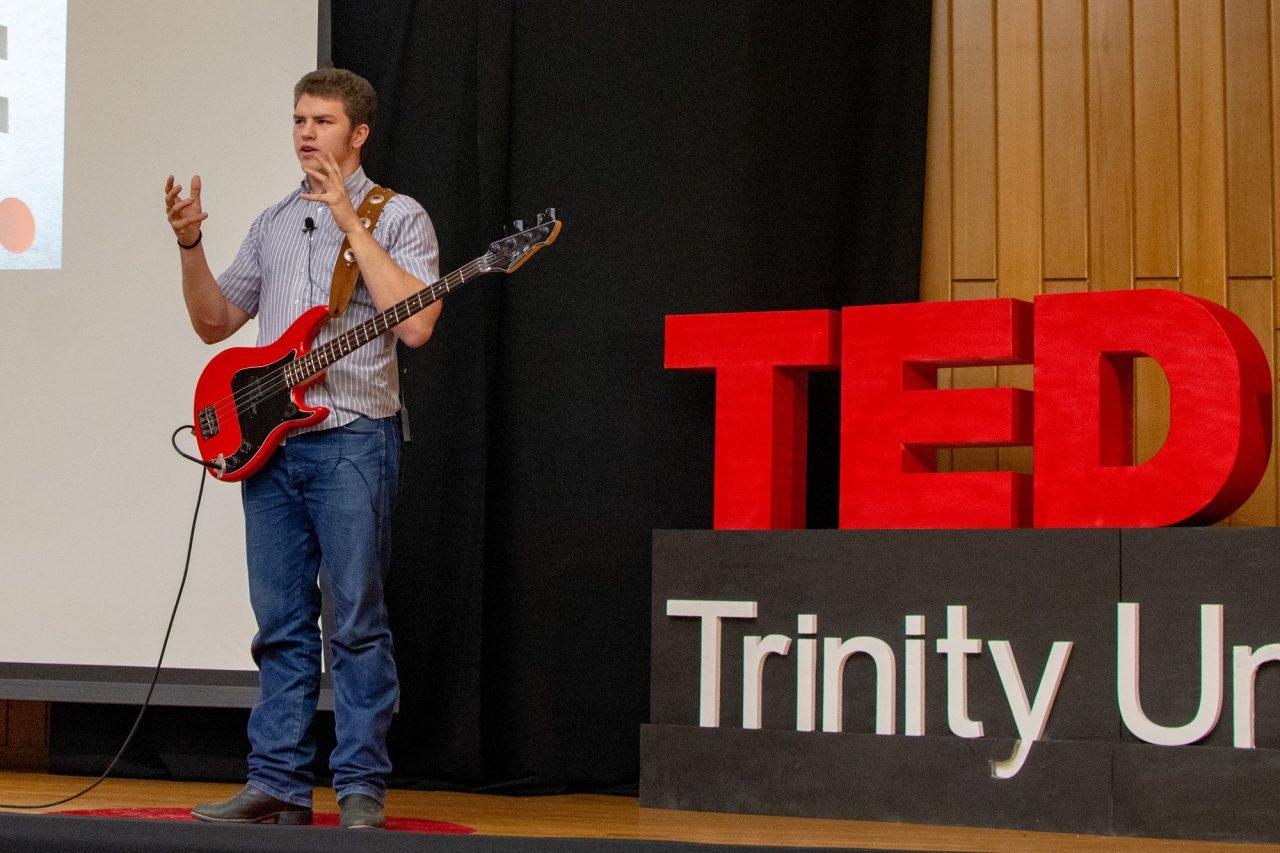Photo by Genevieve Humphreys
TEDxTrinity University held their annual event for the second consecutive year on March 23. About 120 attendees filled Chapman Auditorium to listen to nine speakers discuss topics related to the underlying theme of ‘Agents of Change.’
The speakers were from a variety of backgrounds. Four of the speakers were Trinity students and faculty: Nia Clements, first-year cancer researcher; Jason Johnson, assistant professor of history; Isaiah Mitchell, junior and chairman of the Trinity chapter of Young Conservatives of Texas; and Dennis Ugolini, professor in the Department of Physics and Astronomy.
The speakers from outside of Trinity were Lisa Bilyeu, president of wellness studio Impact Theory; Susan Cunningham, advisor for research company Darcy Partners; Zuby Onwuta, a blind innovator and disability advocate; Michael Taylor, finance columnist for the San Antonio Express News and the Houston Chronicle; and Kenny Wilson, president and CEO of Haven for Hope.
Prior to the event, junior Rohan Walawalkar, president of TEDxTrinity, encountered some obstacles in the planning, due to some logistical planning necessary from Trinity’s end.
“One of the biggest barriers was learning how to work in a bigger bureaucratic style organization,” Walawalkar said. “Trinity has a hierarchical structure. To get anything done you have to go through and get a lot of approvals from the different departments, especially when you’re doing something on this scale. I’ve only done that once before at a previous event we’ve had, which we didn’t have live speakers for. For example, to get food, we had to contact Aramark to get the exception to the event so that we could get outside vendors.”
In his search to host the event, Walawalkar aimed to stay loyal to TEDx’s original motto.
“The speakers are inspiring, but that’s not what is central of TEDx. TEDx is about ideas worth sharing, ideas worth spreading. And that’s what we’re trying to bring,” Walawalkar said. “I speak of these people because I find them impressive, and I find them inspiring, but that does not make them great speakers. It’s that they have something to contribute, anything that can change a person’s perspective about issues in society today. That can change a person’s perspective on their own mind, like Lisa’s mindset. Chris Anderson, the head curator of TEDx Talks said, ‘Every speaker is on stage to give the audience member a gift. And that gift is the idea, the central essence of their talk.’ That’s the way he’s structured TEDx and wants TEDx to be structured, so that’s what we’ve tried to do.”
Mitchell appreciated that Walawalkar chose to feature a diverse range of viewpoints.
“TEDx talks have a reputation. They have a different reputation depending on who you ask. Positively, their strengths are that they seek out fresh ideas that hopefully people haven’t had much exposure to before,” Mitchell said. “And the weakness that a lot of people, like me, have seen is that the more famous TEDx talks tend to be more on the left. And Rohan recognized that too. He’s not a conservative by any means at all, but he recognized that. And he wanted a greater array of viewpoints and so he actively sought that out the in the speakers he brings. He’s not just looking at the most famous people he can think of and trying to get them. He’s trying to make use of people here as well. I’m not the only student speaker, there are other student speakers too. And so that’s really cool because you get more of a local influence with the talk.”
The speakers felt the process taught them about having conversations with people from different backgrounds.
“It is important to share your ideas. I know that, not at Trinity, but in the outside world, sharing thoughts and ideas can be daunting because you never know how people will take them. There’s always the threat of someone taking your thoughts,” Clements said. “But’s it’s just so important to have conversations with people about things without worrying about how they perceive it. The other speakers and everyone was just there for each other, supporting each other and wishing the best on each other. It’s just scary to think about that some environments aren’t like that.”







